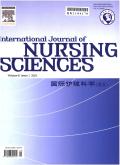The role of ethical leadership in promoting internal whistleblowing among nurses: A dual-mediation model analysis of psychological safety and reporting attitudes
IF 3.1
3区 医学
Q1 NURSING
引用次数: 0
Abstract
Objectives
This study aimed to investigate the dual mediating roles of psychological safety and reporting attitudes in the association between ethics-centered leadership and internal whistleblowing among nurses.
Methods
A multicenter, cross-sectional study design was employed, involving a convenience sample of 273 nurses among five university hospitals from August to October 2024. Data were collected using a demographic questionnaire, Ethical Leadership Scale, Psychological Safety Scale, Positive Attitudes Toward Whistleblowing Scale, and Internal Whistleblowing Scale. Pearson correlation and structural equation model were conducted to test the hypothesized dual mediation model.
Results
The average score of nurses for ethical leadership was 4.14 ± 0.57, psychological safety was 3.80 ± 0.64, reporting attitudes was 4.12 ± 0.67, internal whistleblowing was 3.93 ± 0.52. Ethical leadership had a significant effect on psychological safety (β = 0.38, P < 0.001), reporting attitudes (β = 0.44, P < 0.001), and internal whistleblowing (β = 0.21, P = 0.009). Furthermore, psychological safety (β = 0.26, P < 0.001) and reporting attitudes (β = 0.27, P < 0.001) significantly influenced internal whistleblowing among the nurses. The indirect effect of ethics-centered leadership on internal whistleblowing intermediated by psychological safety was significant (β = 0.10, P < 0.001). Similarly, reporting attitudes demonstrated a significant mediating effect (β = 0.12, P = 0.003).
Conclusions
Ethical leadership encourages internal whistleblowing among nurses by fostering psychological safety and positive reporting attitudes. Therefore, healthcare managers should prioritize ethical leadership development, enhance psychological safety, and foster constructive reporting attitudes that enable nurses to report ethical violations confidently, without apprehension.
伦理领导在促进护士内部举报中的作用:心理安全和报告态度的双重中介模型分析
目的探讨心理安全和报告态度在护士伦理中心领导与内部举报的关系中的双重中介作用。方法采用多中心横断面研究设计,于2024年8月~ 10月选取5所大学附属医院的273名护士作为方便样本。采用人口统计问卷、道德领导量表、心理安全量表、举报积极态度量表和内部举报量表收集数据。采用Pearson相关和结构方程模型对假设的双重中介模型进行检验。结果护士伦理领导平均得分为4.14±0.57分,心理安全平均得分为3.80±0.64分,报告态度平均得分为4.12±0.67分,内部举报平均得分为3.93±0.52分。伦理型领导对心理安全感(β = 0.38, P < 0.001)、报告态度(β = 0.44, P < 0.001)和内部举报(β = 0.21, P = 0.009)有显著影响。此外,心理安全感(β = 0.26, P < 0.001)和报告态度(β = 0.27, P < 0.001)显著影响护士内部举报行为。以伦理为中心的领导在心理安全中介下对内部举报的间接影响显著(β = 0.10, P < 0.001)。同样,报告态度表现出显著的中介效应(β = 0.12, P = 0.003)。结论伦理领导通过培养心理安全感和积极的举报态度,促进护士内部举报。因此,医疗管理人员应优先考虑道德领导的发展,加强心理安全,并培养建设性的报告态度,使护士能够自信地报告违反道德的行为,而不必担心。
本文章由计算机程序翻译,如有差异,请以英文原文为准。
求助全文
约1分钟内获得全文
求助全文
来源期刊

International Journal of Nursing Sciences
Nursing-Nursing (all)
CiteScore
6.10
自引率
2.60%
发文量
408
审稿时长
25 days
期刊介绍:
This journal aims to promote excellence in nursing and health care through the dissemination of the latest, evidence-based, peer-reviewed clinical information and original research, providing an international platform for exchanging knowledge, research findings and nursing practice experience. This journal covers a wide range of nursing topics such as advanced nursing practice, bio-psychosocial issues related to health, cultural perspectives, lifestyle change as a component of health promotion, chronic disease, including end-of-life care, family care giving. IJNSS publishes four issues per year in Jan/Apr/Jul/Oct. IJNSS intended readership includes practicing nurses in all spheres and at all levels who are committed to advancing practice and professional development on the basis of new knowledge and evidence; managers and senior members of the nursing; nurse educators and nursing students etc. IJNSS seeks to enrich insight into clinical need and the implications for nursing intervention and models of service delivery. Contributions are welcomed from other health professions on issues that have a direct impact on nursing practice.
 求助内容:
求助内容: 应助结果提醒方式:
应助结果提醒方式:


